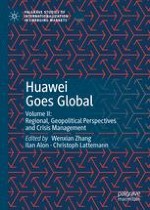2020 | OriginalPaper | Buchkapitel
10. Huawei Goes to India: Can the Dragon and the Elephant Marry?
verfasst von : Deepraj Mukherjee
Erschienen in: Huawei Goes Global
Verlag: Springer International Publishing
Aktivieren Sie unsere intelligente Suche, um passende Fachinhalte oder Patente zu finden.
Wählen Sie Textabschnitte aus um mit Künstlicher Intelligenz passenden Patente zu finden. powered by
Markieren Sie Textabschnitte, um KI-gestützt weitere passende Inhalte zu finden. powered by
